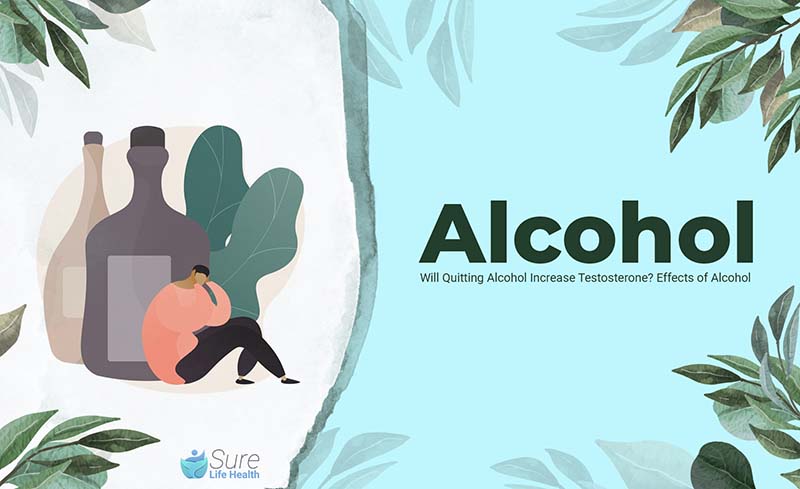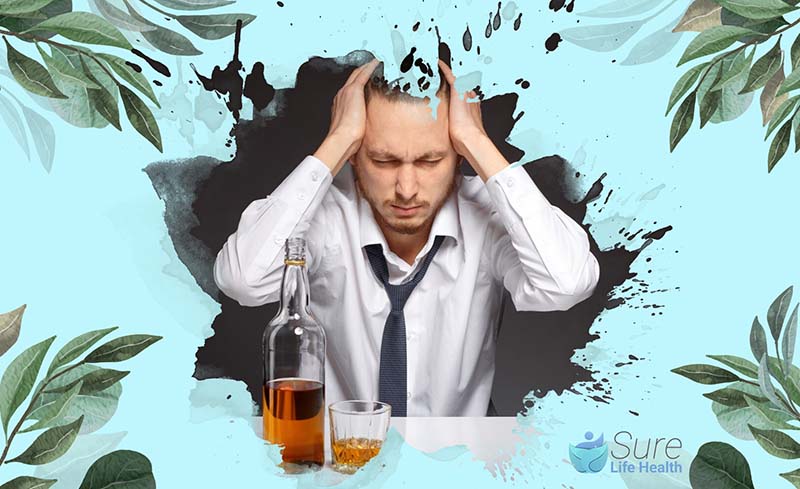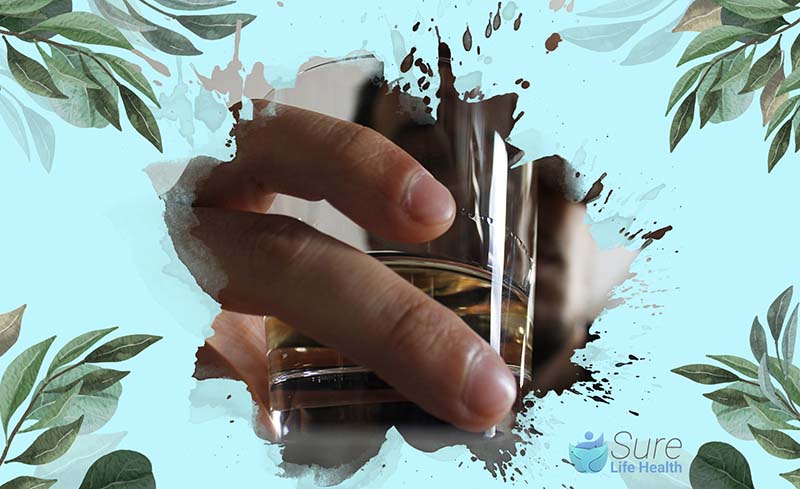Will quitting alcohol increase testosterone production? It’s a complex issue, as drinking alcohol in small and occasional amounts may somewhat increase testosterone levels. However, indulging in larger or more frequent amounts can lead to the opposite effect, potentially decreasing testosterone production. Beyond its impact on testosterone, alcohol consumption might also lower sperm counts, though findings in this area remain inconclusive.
This article explores the nuances of how alcohol affects testosterone and related health concerns. We’ll cover the symptoms of low testosterone and strategies for managing it, illustrating the potential benefits of reducing alcohol intake. Additionally, the discussion extends to alcohol’s influence on sperm production and practical tips for cutting back on drinking.

Will Quitting Alcohol Increase Testosterone
If someone isn’t keen on giving up alcohol but still wants to keep their testosterone levels in check, maintaining a nutritious diet can work wonders for hormone regulation.
However, if they decide to take a break from drinking for at least two weeks, their body will naturally amp up testosterone production and lessen the adverse effects on the brain.
Remember, sustaining healthy testosterone levels is achievable through a balanced diet, regular exercise, and cutting back on alcohol consumption.

How Does Alcohol Affect Testosterone in the Short and Long Term?
Alcohol can influence testosterone levels both in the short and long term. In the short term, consuming alcohol can lead to a temporary drop in testosterone levels within about 30 minutes of intake. This can manifest in symptoms such as reduced energy, irritability, decreased sex drive, and even weight gain. These effects stem from alcohol’s impact on the brain’s hormone regulation centers and may persist for several hours.
In the long term, frequent and heavy alcohol consumption can disrupt the body’s ability to produce testosterone. This disruption occurs through various mechanisms, including decreased levels of NAD+ responsible for testosterone production, heightened estrogen and cortisol levels, and disturbances in the sleep cycle. Over time, these factors contribute to a gradual decline in testosterone levels.
Chronic heavy drinking can lead to further complications such as impaired testicular function, erectile dysfunction, infertility, depression, and other health issues associated with low testosterone levels. However, making changes such as quitting alcohol or reducing intake to a safer level can help mitigate some of the damage caused by prolonged alcohol consumption and support the recovery of hormone levels.
How Long Does It Take to Get Back to Normal After Stopping Drinking?
When you stop drinking alcohol, it can certainly aid in reversing some of the damage done to your brain and reproductive organs. However, the duration of recovery varies depending on factors such as the amount and duration of alcohol consumption.
Recovery from alcohol-related damage can span from several months to even years. It’s important to note that some effects may be irreversible.
One study conducted on mice suggested that damage to the male reproductive system caused by alcohol was partially reversible after 2 months of abstaining from drinking. While findings from animal studies may not directly translate to humans, they do offer some hope for recovery.
Further research involving human subjects is necessary to gain a clearer understanding of the extent to which the human reproductive system can heal itself after alcohol cessation.
Adopting a healthy lifestyle can significantly support the recovery process. This includes steering clear of junk food, maintaining a balanced diet, engaging in regular exercise, and prioritizing sufficient sleep. These habits can all contribute to maintaining optimal hormone levels and overall well-being during the recovery period.

How Does Alcohol Impact Testosterone Therapy?
Alcohol misuse can increase the risk of developing low testosterone levels. Therefore, individuals undergoing testosterone replacement therapy (TRT) are advised to be cautious with alcohol consumption, as heavy drinking can compromise the effectiveness of the treatment.
It is commonly recommended by healthcare professionals to either limit or completely abstain from alcohol while undergoing testosterone therapy.
Furthermore, more than 90% of men with advanced liver disease also have low testosterone levels. Persisting with heavy alcohol consumption can exacerbate liver damage, leading to additional health complications and further impairment of testosterone production.
In summary, minimizing or discontinuing alcohol intake is essential for optimizing the outcomes of testosterone therapy and safeguarding overall health, particularly for individuals with a history of alcohol misuse or liver disease.

The Negative Effects of Alcohol on Your Sperm
Alcohol can impair the function of Sertoli cells in the testes, which are crucial for sperm maturation. This disruption can affect the process of spermatogenesis, which is the development of sperm, involving both testosterone and follicle-stimulating hormone (FSH).
Changes in these hormones can lead to a condition called spermatogenic arrest, where the development of sperm is halted, resulting in low sperm concentration in semen. Research indicates that heavy drinkers are more likely to experience spermatogenic arrest compared to non-drinkers.
Moreover, studies have observed that heavy drinkers tend to have slightly smaller testicles than those who abstain from alcohol. A 2017 study involving a large cohort of healthy men revealed that heavy alcohol consumption may negatively impact semen volume and sperm morphology. However, moderate alcohol intake didn’t show significant effects on these parameters.
Interestingly, moderate alcohol consumption didn’t seem to affect semen quality in another study involving healthy men from Europe and the United States.
Furthermore, while it’s well-established that pregnant women should avoid alcohol, emerging research suggests that heavy alcohol consumption in men before conception might increase the risk of birth defects in their future offspring.
In summary, excessive alcohol consumption can disrupt sperm development and quality, potentially leading to fertility issues and affecting the health of future generations.
FAQ
Does alcohol reduce testosterone?
Yes, alcohol consumption can lead to a decrease in testosterone levels. The effect is more pronounced with higher amounts of alcohol intake.
How much does alcohol reduce testosterone?
The extent to which alcohol reduces testosterone can vary widely among individuals. Heavy and chronic drinking is associated with more significant reductions in testosterone levels.
Which alcohol increases testosterone?
There is no specific kind of alcohol that increases testosterone production. However, evidence suggests drinking occasional low to moderate volumes of alcohol may increase the concentration of blood testosterone.
Is weed or alcohol bad for sperm?
Both substances can negatively affect sperm health, including reducing sperm count, motility, and altering sperm morphology. The degree of impact can depend on the frequency and quantity of use.
Conclusion
Will quitting alcohol increase testosterone levels and improve fertility? It’s well-documented that heavy alcohol consumption can lead to a decrease in testosterone levels and negatively impact fertility.
For men, heavy drinking is typically defined as consuming more than 15 drinks per week. Reducing alcohol intake to safer levels or completely abstaining from alcohol may help reverse the adverse effects associated with chronic drinking.
Quitting alcohol could be a significant step toward restoring testosterone levels and enhancing fertility.
Be sure to explore more insightful blogs from Sure Life Health, where we continue to shed light on the latest trends and breakthroughs in health and wellness.
Professor Gaye Cunnane, PhD, MB, FRCPI
As the Director of Health and Wellbeing at RCPI, Professor Gaye Cunnane is at the helm of initiatives aimed at enhancing the health and well-being of RCPI Trainers and Trainees. Her role extends beyond administration; she is also a respected clinical professor of rheumatology and a consultant rheumatologist at Trinity College Dublin (TCD) and St James’s Hospital. Prof. Cunnane’s medical journey began at TCD, where she graduated from medical school, and her path has been marked by both clinical and academic excellence.
After completing her basic clinical training in medicine, she embarked on PhD studies at University College Dublin and St Vincent’s University Hospital. Her research during this period was focused on prognostic markers in early inflammatory arthritis, a project that saw her collaborating with esteemed universities across Europe, including in Switzerland, The Netherlands, the UK, and Sweden.
Prof. Cunnane’s career took her to the University of California, San Francisco, where she spent three years delving into research on new treatments for lupus. Her academic prowess led her to the University of Leeds in 2001 as a senior lecturer, before returning to Ireland in 2003 to assume her current roles. She has also served as the National Specialty Director for Rheumatology training in Ireland, Programme Director for Basic Specialist Training with RCPI, and as a past President of the Irish Society for Rheumatology.
PUBLISHED ARTICLES
“Rheumatic disease differentiation using immunoglobulin G sugar printing by high-density electrophoresis”: Published in The Journal of Rheumatology, this study reflects her in-depth investigation into rheumatic diseases.
“Benefits of exercise in patients with rheumatoid arthritis: a randomized controlled trial”: This research work, highlighting the positive impact of exercise on rheumatoid arthritis, underscores Prof. Cunnane’s dedication to practical, patient-centered research.
Additionally, Prof. Cunnane has made notable contributions to the Annals of the Rheumatic Diseases, discussing early referral, diagnosis, and treatment of rheumatoid arthritis. She has also been involved in a study on the NCBI platform investigating exercise benefits in rheumatoid arthritis patients.
Professor Gaye Cunnane’s career is a testament to her commitment to improving patient outcomes in rheumatology through rigorous research, clinical excellence, and dedicated teaching. Her work continues to influence the field of rheumatology, both in Ireland and internationally.

